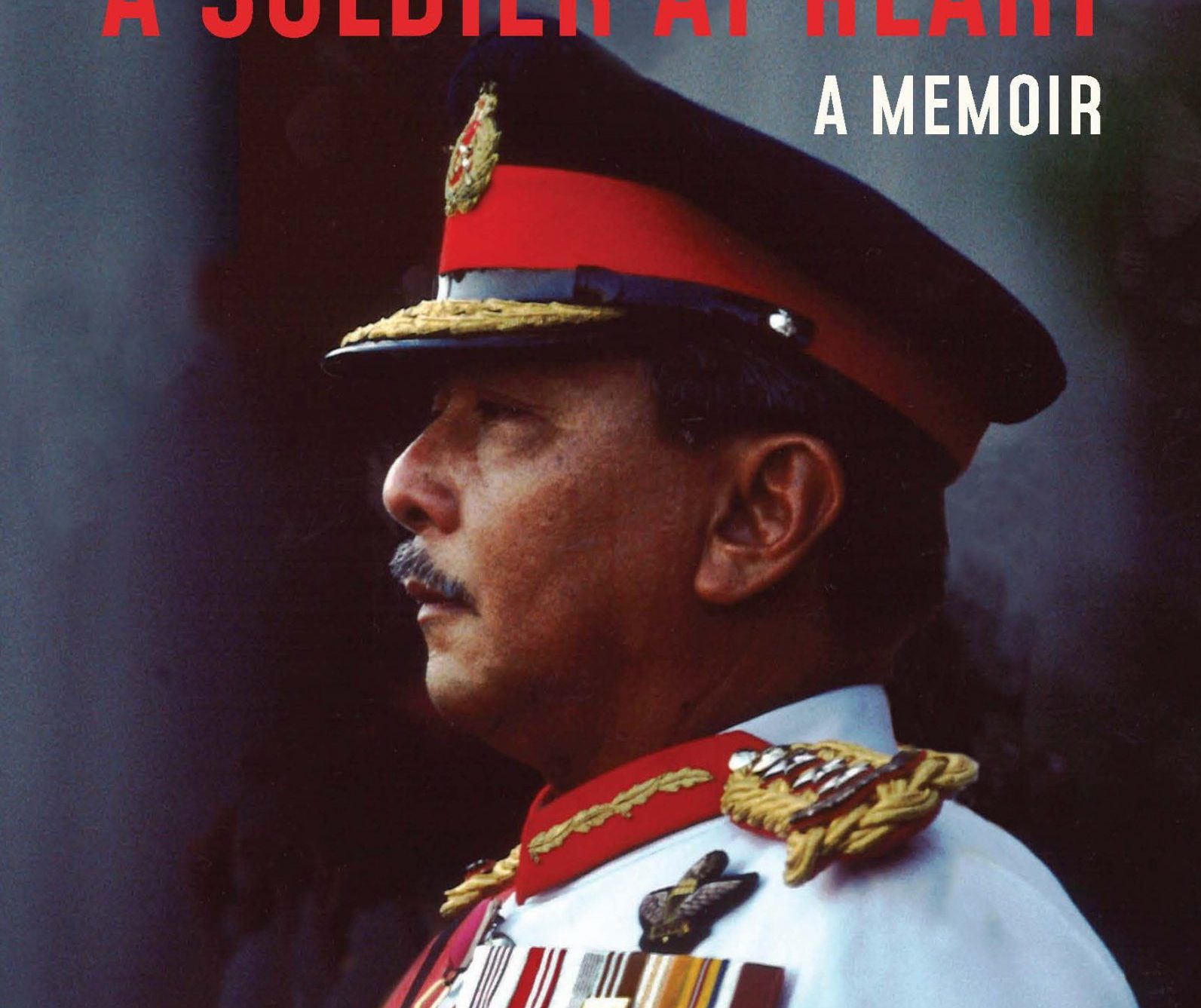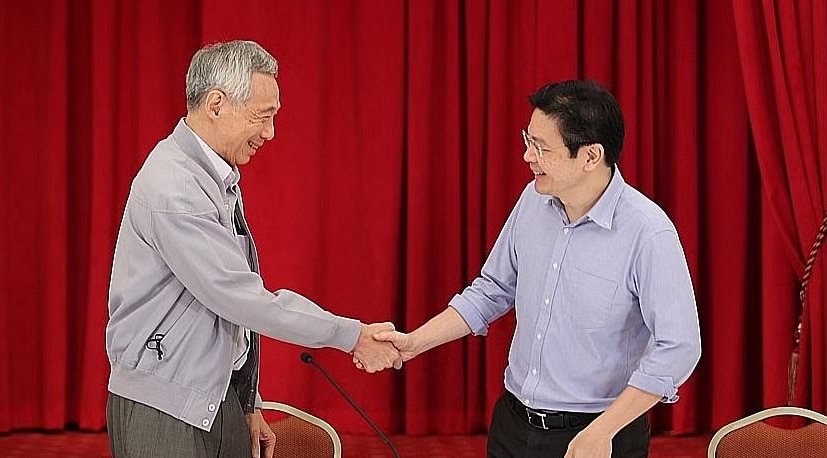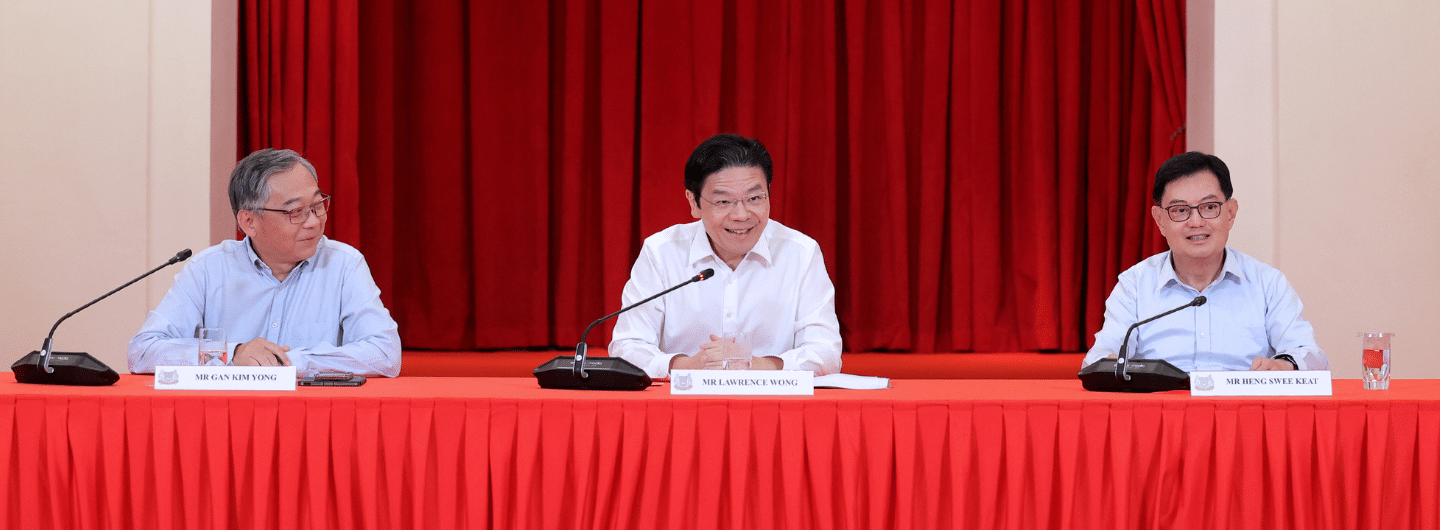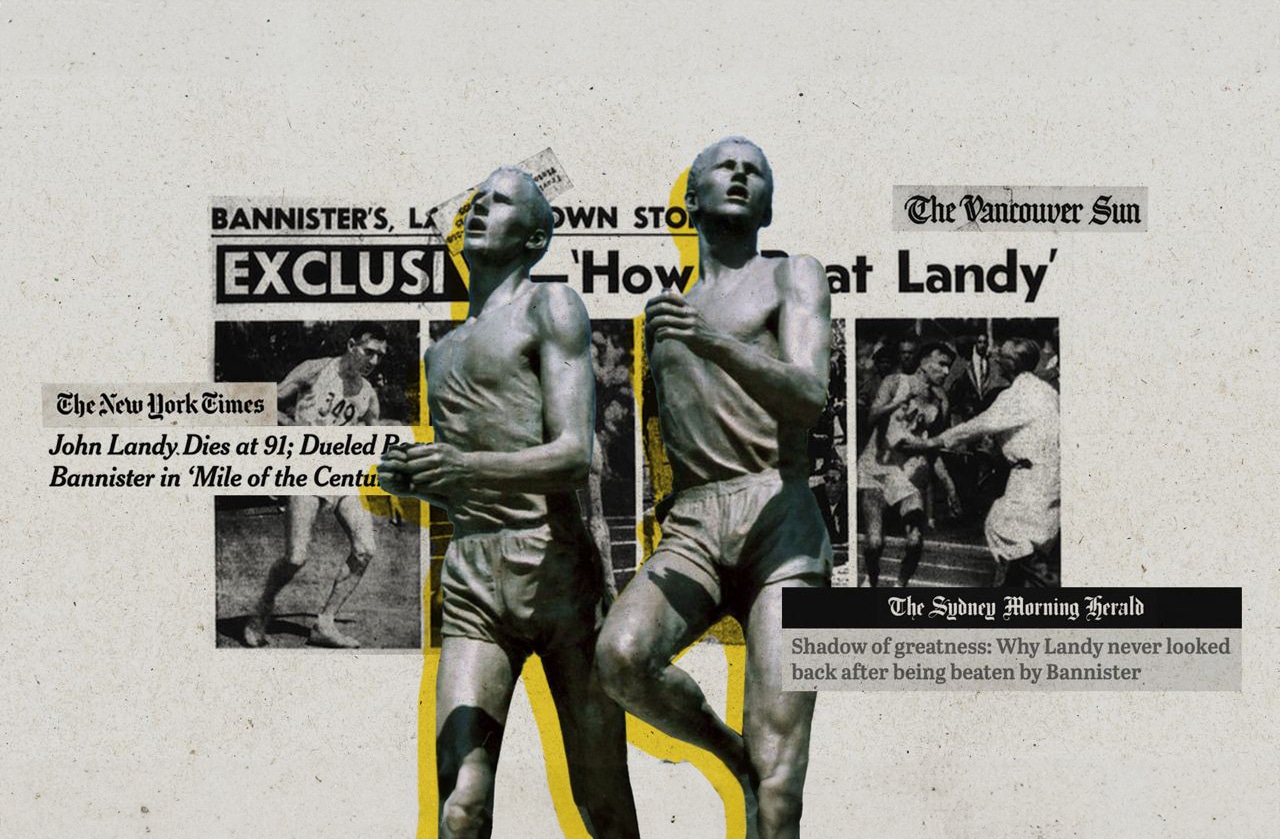“I’m grateful to Him for the many blessings in my life”: General Winston Choo, Singapore’s first top military chief
This SAF Day 2021, Salt&Light salutes all our servicemen and women who are working behind-the-scenes to make our homeland secure.
Winston Choo // June 30, 2021, 2:52 pm
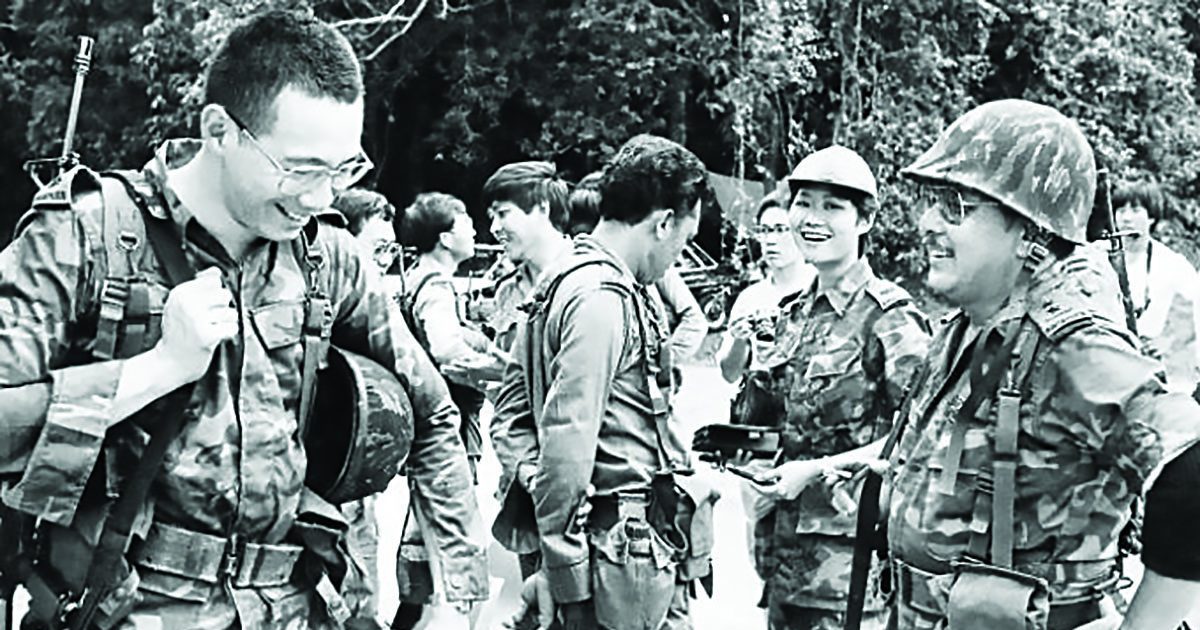
In his memoir released on Monday (June 28), retired general Winston Choo (right) recalls the impact of several influences in his making as a soldier, leader and diplomat. They include his early experiences with sports and church – and the support of his wife, “the biggest gift of all from God”. He also shares anecdotes of his time in the military with men who would become Singapore leaders. Prime Minister Lee Hsien Loong was a colonel in this 1983 photo taken at a small arms competition. Photo courtesy of Landmark Books.
“I thought at best I would end up a major, and have a Land Rover to drive me home. Never in my wildest dreams did I think that one day I would have three stars on my shoulders,” revealed Lieutenant-General (Retired) Winston Choo in his memoir released on Monday (June 28).
“All hell broke loose” on Christmas Eve of 1959 when the then 18-year-old informed his parents that in under 10 days, he was leaving for military college in Port Dickson. Singapore was then self-governing, but her defence was still under the British. The young Choo wanted so badly to be a soldier, he was prepared to accept the lack of career prospects in the military of that time.
The Boys’ Brigade laid a tremendous foundation for my life, and for what I eventually did in the military.
When he retired from the military more than 30 years later, he was Chief of Defence Force (CDF), head of the Singapore Armed Forces (SAF). Gen Choo would continue his service to the nation – as High Commissioner to Australia, chairman of the Singapore Red Cross, and Ambassador to Israel, amongst other roles.
In A Soldier at Heart, Gen Choo, now 79, recalls the impact of several influences in his making as a soldier, leader and diplomat. They include his early experiences with sports and church – and the support of his wife, whom he describes as “the biggest gift of all from God” (see excerpt below).
He also shares of not knowing if he would return alive from the jungles of Sabah during the Konfrontasi in the 1960s. He details his experience in the Istana as aide-de-camp (ADC) to the first President of Singapore, Yusof Ishak. And reveals how he was groomed by Dr Goh Keng Swee (then Singapore’s first Minister for the Interior and Defence) to lead the SAF – and the hurdles he had to overcome.
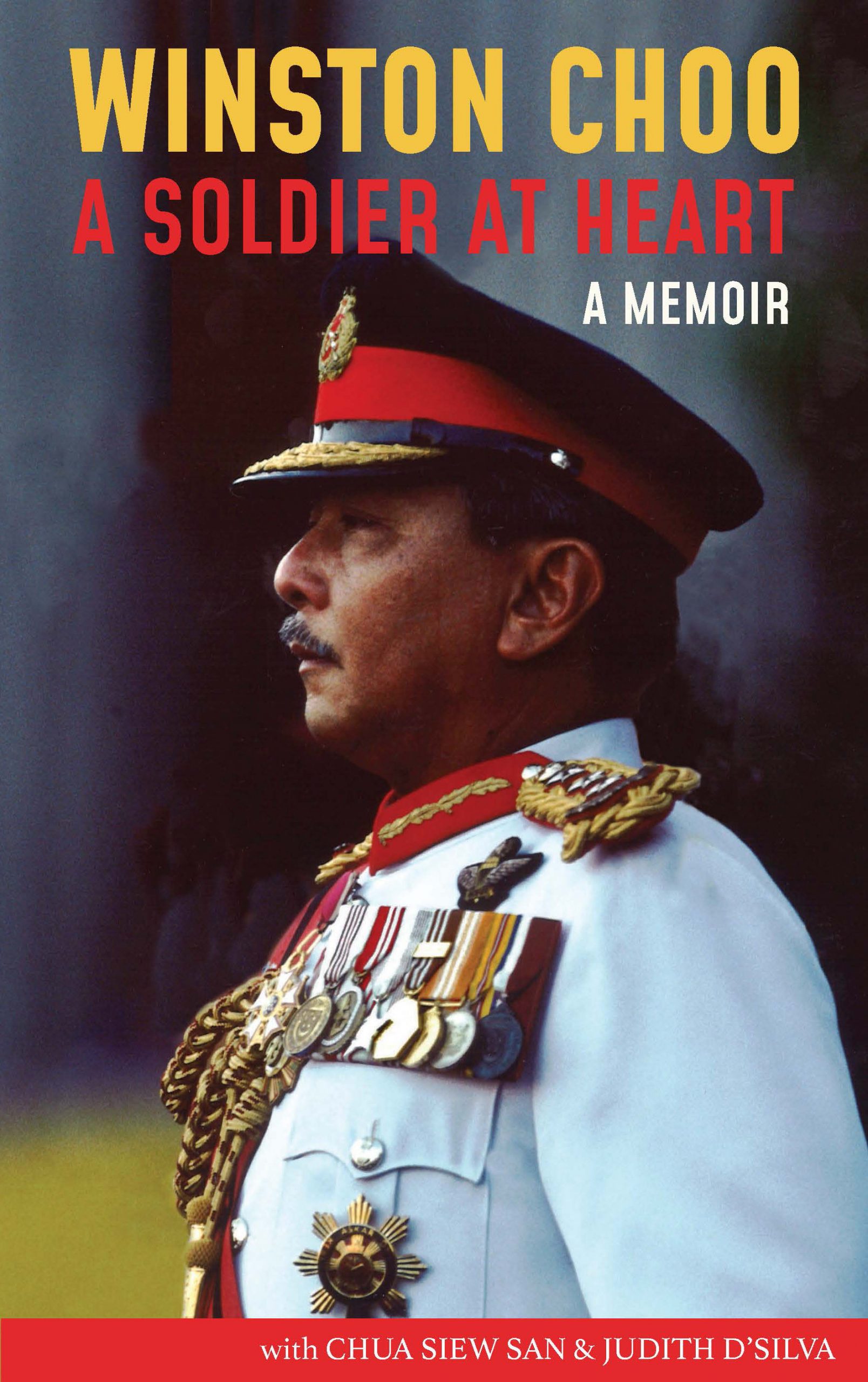
In his 280-page memoir, Gen Choo shares his strategic yet pragmatic approach to shaping the values, culture and structure of armed forces when Singapore was a young nation. He also talks about his early and recent years in the Christian faith, and soldiering on in the face of tongue cancer which was diagnosed in 2017.
Choo was born seven months before the fall of Singapore to the Japanese.
Below are excerpts from his book, republished with permission:
Barefoot games
I was about five years old when we moved to our own home at 18 Makepeace Road in Newton. There, I came out of the shell of my earlier sheltered life.
We took a bus all the way to Punggol to cut branches from mangroves because they made good catapults.
I made friends with all the neighbourhood boys, and I grew up speaking some Malay and Teochew. We spent our time catching spiders and fish from the drains, and had spider fights and fish fights. We took a bus all the way to Punggol to cut branches from mangroves because they made good catapults. We played in the open area behind my house which was overgrown with lalang (a tall coarse grass). We flew kites, played football and other games on that laterite road, running barefoot over stones and pebbles.
The things we did developed my love for the outdoors. Our playground included the old cemetery at Kampong Java Road, which is now gone. We played hide and seek there at night. We would hide behind the tombstones and when the cars stopped at the traffic light, we popped our heads out to scare the drivers. I was mischievous by nature.
Pretend gangster
In school, I was rather reserved and never got into trouble with the teachers. It was in 1948 that I went to Primary 1 in Monk’s Hill Primary School. I had a double promotion after Primary 2, although I do not know how I got that. I was not brilliant, but I always did my schoolwork.
The gangsters tried to harass me, but because my response was a polite “yes, yes”, they eventually gave up.
The schoolboys were a motley crowd from different backgrounds. Race and religion made no difference. We just played happily together.
The boys I played with were not gangsters, but there were gangsters in the area. To survive, you had to know how to interact with them. I had to walk almost one kilometre from my house to Monk’s Hill School. The gangsters demanded that I pay protection money or join the gang or be a runner for them. But I didn’t want to give them money or to join them. So I stayed on good terms with them and didn’t give them any reason to make things difficult for me. They tried to harass me, but because my response to everything was a polite “yes, yes”, they eventually gave up.
I learnt all their codes, their numbers. When the bigger boys bullied me in school, I pretended to be a gangster, throwing out numbers so that the bullies thought I was with the gang.
Runner for athletes
A few of the older boys in the neighbourhood were very seriously into athletics. I would follow them to their training. I carried their running shoes, set up the hurdles, raked the long-jump pits, timed their runs and even ran circuits to warm up with them. I saw first-hand how hard it was to perform well, how important it was to be disciplined and to persevere.
The big teacher with a gentle soul
I went to Anglo-Chinese School (ACS) at Barker Road for my secondary education.
By walking to school I could save 10 cents out of my daily allowance of 50 cents … to spend on outdoor stuff.
I walked from Makepeace Road to Barker Road. By walking I could save 10 cents out of my daily allowance of 50 cents. I also did not spend much at the tuckshop. So I could save 30 cents a day to spend on things, especially outdoor stuff which I found useful or gifts for friends. I had to save for two months to buy a penknife. With a torchlight, I could go out at night, do things with it.
Most of the teachers in ACS were very dedicated. They were strict and stood for no nonsense.
One teacher I will always remember is Mr Gurdial Singh, my literature teacher in Secondary 2. He was a big man with a very gentle soul. He gave me a prize for submitting a poem that inspired me most. These lines from the poem “The Ladder of St Augustine” by Henry Wadsworth Longfellow became my guiding light: “The heights by great men reached and kept were not attained by sudden flight, but they, while their companions slept, were toiling upward in the night.”
The sporting life
I enjoyed my classes, and even studied Latin as my father had visions of me becoming a doctor or lawyer. But I spent more time on extra-curricular activities than studying. Sports was my big love. I joined any team that wanted me. So I played football, rugby and hockey. There were seasons for the various sports, so I could participate in every sport I enjoyed throughout the year.
We hosted the St Joseph’s football team to a reception in our tuckshop – our way of expressing how sorry we were.
I believe that team sports teach you to work together with people, help you to understand people, and provide opportunities to develop leadership skills. I reckon I did well later in military college because I was a sportsman. I could take the rough and tumble, I understood teamwork and could get people to work with me.
When I was Chief of Defence Force (CDF), I made rugby compulsory for Officer Cadet School (OCS). It is a game for ruffians played by gentlemen. You need not only teamwork but also strategy and tactics. You must be able to think fast, and you need guts and character.
The other thing about sports is the importance of sportsmanship, a trait that is so consequential in life. During a football game with St Joseph’s Institution, a small scuffle between two players degenerated into an ugly punch-up between the teams. I was really ashamed of what happened. I consulted my football master and we came up with the idea of inviting the opposing team over for tea. A week later we hosted the St Joseph’s football team and their teachers to a small reception in our tuckshop. This gesture was our way of expressing how sorry we were. We shook hands and I really felt relieved and so much at peace after that.
A BB boy for life
I joined the 1st Company, Boys’ Brigade (BB) in Prinsep Street Presbyterian Church, where my family worshipped. I went to Sunday School there and later was a member of the Youth Fellowship. I got to mix with youths from all sorts of backgrounds, different schools, different areas.
Wholesome activities afforded through school, church Youth Fellowship and the BB were wonderful opportunities for me to develop my social skills and stood me in good stead to being an officer and gentleman.
I joined the Junior BB when I was 9 years old, then called the Life Boys, and from 12 to 17 I was in the Senior BB. At that time, most companies of the BB were started in churches. Today they are in schools but affiliated to churches.
What appealed to me most about the BB were the uniform, discipline, teamwork and camaraderie.
My deep involvement in the BB kept me occupied and off the streets. It also provided me a moral compass and spiritual ballast. The BB laid a tremendous foundation for my life, and for what I eventually did in the military. What appealed to me most were the uniform, discipline, teamwork and camaraderie – the whole way of life, which I really valued. I enjoyed drill, and I enjoyed the outdoor activities, especially camping.
We were a band of brothers bonded by strong friendship. I also joined the BB Band and was a bugler.
The activities in the BB included classes to gain proficiency and qualify in various skills, upon which we would be awarded badges. There were badges for gymnastics, lifesaving, band, knowledge of plants, Bible education, and so on. The Queen’s Badge was the highest award. We had to have a specified minimum number of years of membership as well as near-perfect attendance for five years and chalk up points from the badges we earned. Only after attaining all these could we apply for the Queen’s Badge.
It took a lot of time and hard work. Today it is called the Founder’s Award. In 1958, I was conferred the Queen’s Badge by the Governor of Singapore, Sir William Goode, at a parade in the Padang. It was a very proud moment for me.
A rash decision
I left the BB at 17 when I was in Pre-U 1. Some people in my batch left as sergeant or staff sergeant. I left as a corporal. I left earlier than I should have, which is something I regret to this day. You see, I had applied for selection to attend the BB international camp overseas. I applied twice, and the second time I went all the way to the finals but did not make it. I was devastated. It had taken me so many years. I had done so much, but I still wasn’t good enough. In those days, being selected to attend such an international event was the only way for me to get to travel overseas.
I felt very sorry later. I realised that it was very immature of me to think that way. And I told myself: “You must never react this way again.”
I left the BB as a corporal. I left earlier than I should have, which is something I regret to this day.
Many years later, when I contributed an article for the book published by the 1st Company BB, I related this episode and said that I had failed. Then one of my mates clarified that I was wrong. He said that in fact I had been one of the two selected but because they wanted to give it to only one person from the 1st Company, someone from another company who perhaps was not as good was selected instead of me.
Fortunately, I am still regarded as a distinguished member of the BB. And now I have been designated the Honorary President, a lifetime appointment. We have very good people who were in the BB, like pioneer civil servant Sim Kee Boon and President of the Singapore Industrial Arbitration Court Tan Boon Chiang, and many others who later became regulars in the Singapore Armed Forces.
I think being a member of a uniformed organisation is irreplaceable because it prepares a child, boy or girl, for life. I sit on the selection panel for the President’s Award for Primers, who are BB members who have gone beyond their O-levels. I meet these young men and I can see what the BB has done for them. They stand out. Similarly, when I interviewed people in the SAF I could also see the difference – how working hard and doing well in a youth organisation can help put you a notch above the rest.
The biggest gift
When I look back at my life, I do not think I could have asked for more. My Christian upbringing at home, in ACS, in the BB and in church has taught me to put my trust in God and be grateful to Him for the many blessings in my life. And there have been many wondrous gifts. The biggest gift of all from God has been a very special woman – Kate, my wife and life partner.
Kate accepted the postponement of the wedding plans when I became ADC to the President and took the disappointment stoically.
From the time we first met, I knew that this was someone special whom I wanted to be with. I was then in the BB and she was in the Girls’ Brigade in Prinsep Street Presbyterian Church. I was 13 and she was 12. I found her very likeable and very kind, with never a nasty word for anybody.
After I graduated from FMC (Federation Military College) I started to date Kate. The relationship survived my frequent absences – away on courses and training, on operations, and then in the jungles of Sabah during Konfrontasi. Both of us did not know whether I would be coming back alive from Sabah. Even after we were engaged on 5 June 1965 and planning to get married, she accepted the postponement of the wedding plans when I became ADC to the President and took the disappointment stoically. She patiently tolerated the changes that came along with my life as I did not have much time for her.
When we finally could get married after I left the Istana, Kate faced the prospect of not having a church wedding. She was raised an Anglican and was looking forward to getting married in St Andrew’s Cathedral, where we worshipped. She could not imagine anything other than a church wedding; it meant a great deal to her.
If I had three stars, Kate should have been given four.
After marrying me, Kate had to face many disruptions in our lives and handle things on her own, as I kept moving to new postings, going away on courses, and travelling on official visits. Even for the births of our children. She took every disruption, every challenge, and every burden in her stride without even a whisper of complaint.
Kate played the role of the CO’s wife extremely well because she saw this as her duty. The challenge was exponentially bigger when I was appointed DGS (Director-General Staff). Just as it had come as a bolt of lightning for me, it was an equally huge shock for Kate when she was told of my appointment. My DGS duties and overseas travels kept me away from her and the family most of the time. She was literally on her own, raising the children single-handedly. She willingly gave up teaching, something she loved very much, so that she could look after the children and run the home. When I was asked to look into setting up an Officers’ Wives Club, Kate willingly and generously took on the job to initiate this. She had always shared my belief in the importance of wives and husbands supporting their spouses in the military and being by their side so that they could undertake their tasks with confidence. She carried no rank, but I can say that if I had three stars, she should have been given four.
She shared my belief in the importance of wives and husbands supporting their spouses in the military.
Kate was again there by my side and sharing in the emotions of my leaving the SAF after more than 30 years. Kate took on the tasks of overseeing the rebuilding of our home, and the packing and moving out of our quarters, uncomplaining and loving as ever. Then, before we could settle down in our new home, we had to pack our bags and go to Australia when I was appointed High Commissioner.
As a diplomat’s wife, Kate was wonderful. She ran the residence in Canberra with aplomb and gave it a Singapore character, going out of her way to prepare Singapore meals whenever we hosted. Kate was like a mother to the embassy staff and a grandmother to their children.
Most importantly, Kate kept our family and me spiritually strong. I must admit that I had not always been devout, nor had I led an exemplary Christian life. But she never faltered and she ensured that we kept our faith. This was especially so after our first grandchild came along. That was when I said to myself that the backsliding must stop and it was time that I return to God, not only for my own salvation but also because my home must be a sanctuary for my children and my grandchildren, and it must be a Christian refuge.
A Soldier at Heart: A Memoir, $35 (before GST), published by Landmark Books, is available at major bookstores. It will be officially launched on July 16 by Senior Minister and Coordinating Minister for National Security Teo Chee Hean.
RELATED STORIES:
“Without God, I would’ve just been your average Mr Nice Guy”: Olympian and ex-MP Dr Tan Eng Liang
“For God and country”: Chaplains carry on tradition of service and faith
We are an independent, non-profit organisation that relies on the generosity of our readers, such as yourself, to continue serving the kingdom. Every dollar donated goes directly back into our editorial coverage.
Would you consider partnering with us in our kingdom work by supporting us financially, either as a one-off donation, or a recurring pledge?
Support Salt&Light